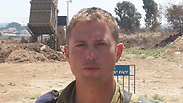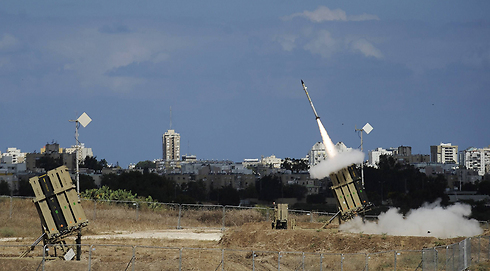
Major Shay Kognitsky
צילום: גלעד מורג
Iron Dome commander: We made decisions that saved lives
Revolutionary missile defense system records 90% success rate in Operation Protective Edge.
The Iron Dome missile defense system has revolutionized a conflict between Israel and Hamas in Gaza which has repeatedly flared up and died down since 2007 when Hamas violently overthrew the Palestinians Authority in the Strip.
Operation Protective Edge, like previous bouts of fighting with Hamas, centered on over 3,000 rockets that was fired from Gaza, 578 of which were intercepted by Iron Dome including several dozen over the greater Tel Aviv area.
"The greater Tel Aviv area is a complicated zone because it's densely populated with 2 million people," said Major Shay Kognitsky, commander of an Iron Dome battery covering central Israel.
"We've planned extensively for this fight, since the end of Operation Pillar of Defense. Preparations were made at the operational and intelligence levels and so the good results are the manifestation of early preparation," added Kognitsky.
He also addressed the different kinds of threats facing central Israel saying that, "The area is very complicated partly because of the types of rockets being fired. These aren't Qassams and Grads, but big rockets like the Fajr and M-75 and this demands precision from us."
"I can't reveal everything, but I have to stress that there were many decisions made by my soldiers that saved lives," said Kognitsky.
The Major added that terrorists in Gaza had fired rockets aimed at Ben Gurion International Airport. "The debate whether or not to close the airport had nothing to do with us. We work closely with the civil aviation and there are all kinds of considerations there."
"In the end, the fact is that no rocket or shrapnel hit the airport and there was an uncompromising level of flight safety," said Kognitsky.
Second Lieutenant Don Lashem, commander of a battery launching squadron said that, "In this fight we all acted together, civilians and soldiers for the same goal. We felt a great responsibility on our shoulders."
"We look around here and see what we helped to defend. It's a heavy responsibility and I feel that we did our jobs well," said Lashem.











